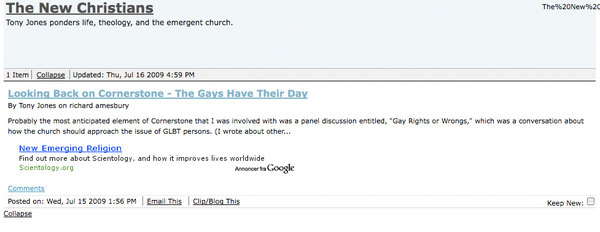“It’s a clean sweep for the liberal agenda in the Episcopal Church,” said David Virtue, editor of VirtueOnline.org, a conservative Web site. “The orthodox are finished.”
So begins the NYTimes article on the annual cluster meeting known as the Episcopal Church General Convention.
(Too harsh, you say? Well, here’s how the Episcopal Church describes its own General Convention:
Resolutions proposed for discussion at
convention are referred to legislative committees, which consider,
amalgamate and perfect them before presenting them on the floor of
convention. Legislative committees hold hearings on legislation at
which the following can speak: deputy, registered alternate or
registered visitor. These are held in convention hotels near the
Convention Center.
Honestly, I’ve been following the Twitter hashtag, but there’s so much insider lingo that even I, a pretty educated observer, cannot possibly understand what they’re tweeting about.)
OK, enough of that rant. My feelings on denominational bureaucracies are well documented.
No, wait, let me say one more thing. When did we come so far off the rails that the words “convention,” “legislative,” and “committees” become constitutive of our promulgation of the gospel? My favorite tweet came a couple days ago from a clergywoman (“rev” was part of her Twitter handle!) that simply read, “AAAAAAAAAAAAAAAAAAAAAARRRRRRRRRGH!!!!”
OK, now to the issue at hand. The Episcopal Church has voted to allow all persons to be ordained, regardless of their sexual orientation. Many will see this as an inevitable slide into radical-anything-goes-relativism by a small and shrinking mainline denomination — which has, it must be noted, a cultural significance that is way disproportionate to it’s numbers. Why? Because it’s populated primarily by rich, white people. There are roughly as many Episcopalians in the US as Jews, but no Jew has been elected President of the US. There have been eleven Episcopalian Presidents, more than any other denomination.
The result of this vote is that more dioceses and parishes will go bishop-shopping. Thinking their own bishop too liberal, they’ll look to another diocese in the States, in Africa, or one of the new, non-geographical dioceses for oversight.
But, of course, this is a breach of episcopal polity. The episcopal system of church government is fundamentally geographical, and incumbent on submission to the bishop’s authority, whether the bishop be appointed (Catholic, Orthodox) or elected (Episcopal). When you start shopping around for a bishop with whom you agree, you are, by definition, no longer operating under an episcopal system. But you’re not congregational or presbyterian either. You’re just broken.
Anyway, back to that “the orthodox are finished” quote from the NYTimes. I wrote for Patheos that one’s stance on homosexuality has become the new Shibboleth for conservatives.
So Evangelicals have turned their gaze on a new shibboleth — gay
marriage — and the correlations are clear: replace the oversized
placards of aborted fetuses with Westboro Baptist’s “God Hates Fags”
signs at military funerals; swap out Operation Rescue for the National
Organization for Marriage; exchange James Dobson for, um, James Dobson.
Tim Dalrymple and others have taken issue. “No!” they protest, “Evangelicals don’t do this. This is not a question of one’s orthodoxy or one’s salvation. Don’t caricature us like that.”
But then, right their in the Gray Lady, one of their number says it as clear as can be: If you don’t stand with him against gay ordination/marriage/rights, you are not orthodox. Because, of course, David Virtue is the arbiter of orthodoxy. Just look at his picture — he’s wearing an academic gown, so he must know what he’s talking about.
***
OK, snarkiness aside, I have a bunch of friends who are Episcopal (since I fit their profile). I know that this week has been probably painful for many of them. I, too, grieve for the coming Anglican schism.
But I implore them to look beyond the gay issue. The bigger issue is that they employ a medieval form of church polity strange hybrid of medieval (bishops, dioceses, sextons) and modern (legislation, amendments, committees) polities, which will inevitably fail in this postmodern, wiki-world.

